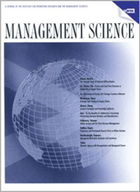Mutual funds – trading on lucky bets or true information advantage?

Text Catherine Walker
Mutual funds have become an increasingly important part of the financial investment landscape. Since the 1980s the take-up has been phenomenal: by 2009 US mutual funds were managing $11 trillion of assets. For retail clients and larger institutional investors such as pension funds, they present an attractive proposition. Not only are the investments relatively liquid, but decisions on which stocks to trade and when are left in the hands of experienced professional fund managers.
But does experience always confer an advantage? For those studying the performance of mutual fund managers, this has long been questionable. A recent study of mutual funds in the US by ERIM Scientific Director <link people marno-verbeek>Professor Marno Verbeek and former colleagues Dr Hao Jiang and Dr Yu Wang reveals important new evidence on the mutual fund industry and stock market efficiency.
Marno Verbeek explains:

Fund companies set themselves benchmarks – they might take, for example, the S&P 500 or the Wilshire 5000. A lot of effort and money then goes into trying to outperform the benchmark, and in actively managed funds, managers do everything within their mandate to exceed it – tracking stocks every day, making decisions daily on whether to trade.
Unfortunately, though, when we look at how they are doing, most professional fund managers do not manage on average to beat the benchmark. One might then ask, are they worth the money? Do they have any skills, knowledge or superior ability to identify which are good investment opportunities?
Of course, there are always some people who make lucky bets, just as there are always some in the casino who win money, even though on average most lose. Randomness always generates winners and losers – the real test for us is to separate the randomness from the true skill component, the true information component.
Some academics argue that financial markets are very close to being efficient, and that it is therefore not possible to beat the benchmark by actively selecting stocks. Because if everyone knows that a particular stock is going to do well, people will trade on it immediately, and the additional profitability then disappears. So all this active management does not make much sense – it’s a waste of resources.
But from our research, we challenged that conclusion a little. While we too found mutual funds failed on average to outperform their benchmark, when we looked more closely at the portfolios of mutual funds and the positions they are taking, we saw evidence to suggest there is an information advantage – that the fund managers do in fact know what they are doing.
Our first step was to define a benchmark for each mutual fund, telling us how close the fund is to a certain stock market index. We then compared the stocks owned by this mutual fund at a particular point in time with the composition of the benchmark. If the benchmark says that 1% of the fund should be invested in company x, and if the mutual fund is investing 2%, we term this an overweighting. If the investment is less than that benchmark, it is an underweighting.
These overweighting and underweighting decisions by each mutual fund can be seen effectively as bets that the fund is taking. A bet will be successful if the stock does better than the market expects. The question is, are those bets based on information held by the fund?
When we aggregated all these under- and overweighting decisions across all mutual funds and analysed them against earnings surprises by firms, an interesting finding emerged. We saw that stocks that are more overweighted on mutual funds tend to do relatively well in subsequent months. Conversely stocks that are underweighted subsequently do relatively poorly. So mutual funds apparently do know something about the fundamentals of these firms that has not yet been revealed to the market, otherwise it would be incorporated into prices.
 So, to return to our original question, if these mutual funds have an information advantage that allows them to take better decisions and generate higher returns, why do we still see poor performance by the average fund?
So, to return to our original question, if these mutual funds have an information advantage that allows them to take better decisions and generate higher returns, why do we still see poor performance by the average fund?
The answer is that funds typically invest only a small percentage of their portfolio –about 10% of their money – in stocks in which they have an information advantage. So when spread over the entire portfolio the good performance is diluted because most of the portfolio is just at the benchmark.
We saw that funds made a 7% additional return on the 10% of their portfolio which is overweighted – but that then translates into only 0.7% across the entire portfolio, and that is before fees, expenses and transaction costs. With mutual funds typically charging fees of around 1%, the net result is still negative, so on average the funds do slightly worse than the benchmark.
What implications might our findings have for mutual funds? It may suggest advantages in giving fund managers more individual discretion to deviate from their benchmark.
Normally when setting the benchmark the fund company will also prescribe the degree to which a manager can deviate from it, in either direction – known technically as a ‘tracking error’. This then determines how active you can be as a fund manager. If the company gives you greater flexibility, permitting you to deviate three or four percent from the benchmark so long as you do well on average, you can then take more risks. So could there be an argument for fund companies to give certain groups of managers more leeway in trying to beat the benchmark? It is certainly an interesting question for the industry to consider.
| ‘Information content when mutual funds deviate from benchmarks’ by Hao Jiang, Marno Verbeek and Yu Wang will be published in a forthcoming issue of Management Science. |
- <link people marno-verbeek>Marno Verbeek is Professor of Finance and Dean of Research at RSM and Scientific Director of ERIM.
- Hao Jiang is Visiting Assistant Professor at McCombs School of Business of the University of Texas at Austin.
- Yu Wang is Portfolio Manager/Researcher at IMC Asset Management and an ERIM PhD graduate.


